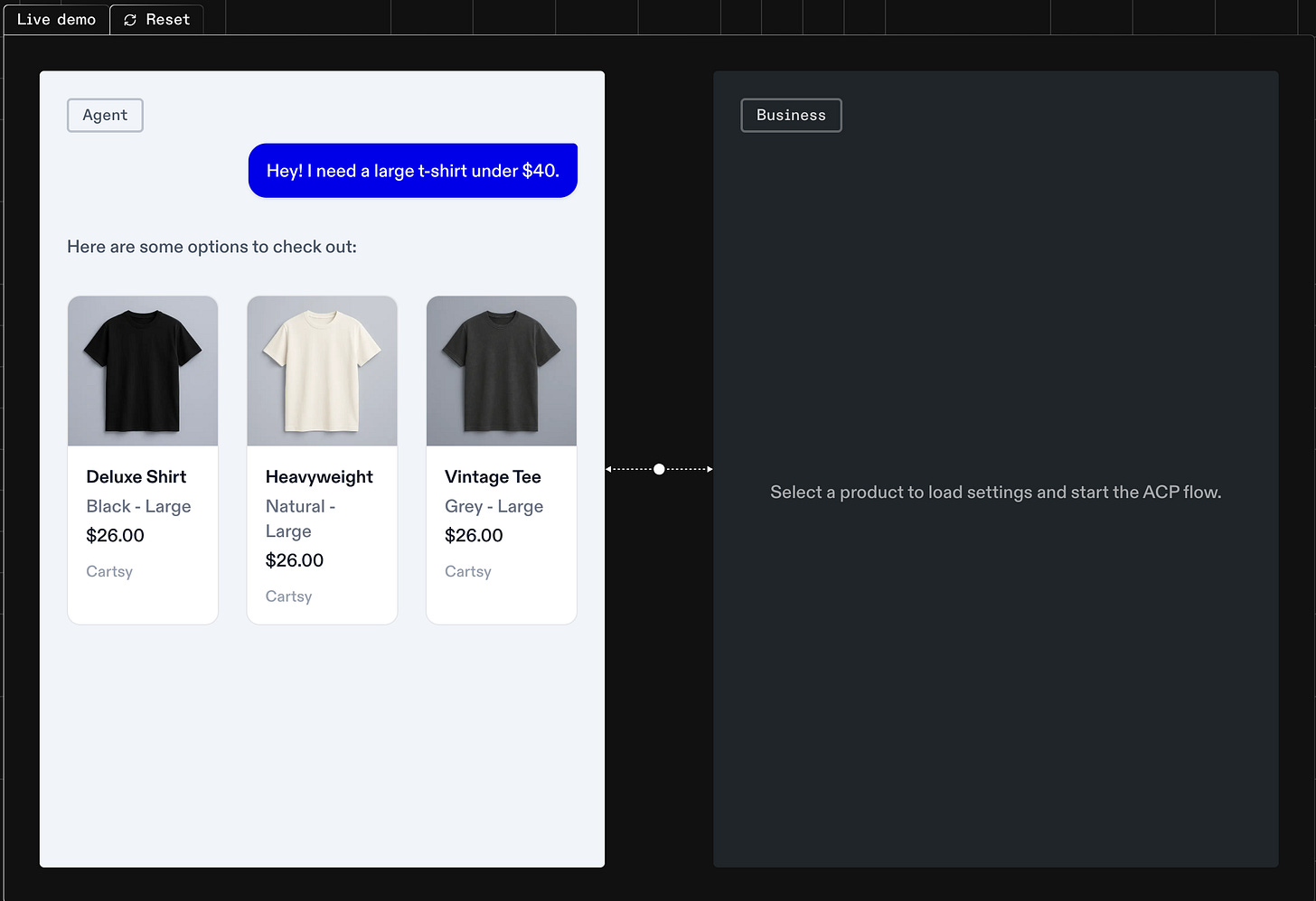Your AI wants your credit card
The entire mechanism of discovery and decision-making is shifting under our feet
Stripe and OpenAI just shipped the ability for ChatGPT to buy things with your money with Agentic Commerce Protocol (ACP). Millions of Etsy and Shopify sellers are already integrated into ChatGPT. Yay, your AI can now complete purchases while you sleep.
The possibilities are seductive. ChatGPT watching flight prices, pouncing when your Bali trip ticket drops below $600. Auto-buying that laptop after cross-referencing cost-value combos of the latest specs. Finally solving the micropayments problem…20 cents to read that paywalled article? Done before you finish asking.
Google’s building the same thing with 60+ partners including Amex, Coinbase, and Mastercard.
Everyone sees the same future: AI agents with wallets.
There’s just one problem: we don’t even trust AI to write emails without supervision. But we’re supposed to hand over our credit cards?
Current answer: absolutely not.
The gap between capability and comfort is massive. We can now enable your AI to battle airline pricing algorithms, execute complex purchasing strategies, do your taxes... But most people still double-check when ChatGPT does basic math.
What Actually Happens First
I predict that before we get autonomous shopping agents, we’ll get AI as the world’s most aggressive sales assistant.
“Based on your calendar, you need flights to Bali. I found three options under $600. Click to approve.”
“That laptop you wanted just hit $599 at Walmart. Want it?”
“Your moisturizer is almost out. Same brand or try this better-reviewed alternative?”
Not as sexy as autonomous shopping. But every one of these AI-influenced purchases flows through Stripe’s pipes.
The structured product feeds, the delegated payment protocols laid out in the ACP lay the ground for AI to become the world’s most sophisticated product recommendation engine, with Stripe handling attribution and payment.
Stripe’s recent $1.1 billion Bridge acquisition (startup building stablecoin rails) hints at longer-term ambitions, like when agent-to-agent commerce might need instant, near-free, autonomous transactions. In this future world, traditional payment rails with 2.9% fees that take 2 to 5 business days to settle a transaction no longer work.
The Trust Speedrun
Consumer behavior usually changes glacially. Until it doesn’t. Remember when nobody would put credit cards online? Then Amazon happened. Nobody would get in strangers’ cars? Then Uber happened.
The catalyst for autonomous commerce won’t be convenience. It will be our cheapness. It’ll be AI agents getting so good at finding deals that NOT using them feels like losing money.
Imagine your friend’s AI saved them $5,000 last year on a car purchase. How long before you cave?
The uncomfortable questions:
When your AI agent has purchasing power, whose interests does it serve? Yours? OpenAI’s? The merchant offering the highest API kickback?
What is the business model here apart from affiliate marketing? Ads? Agent commerce only works if agents are genuinely user-aligned. The moment ads enter the equation, we’re back to the current model.
The AI ads business model ouroboros:
OpenAI introduce “sponsored suggestions” in agent responses
Users realize their AI agent isn’t their agent. It’s an ad platform
People turn off autonomous purchasing permissions immediately
Is the entire agent commerce vision incompatible with the business model of advertising?
Despite these trust challenges, the infrastructure is being built today.
For founders and builders, the opportunity is enormous.
The last era minted giants like Shopify, Amazon, and Google by building infrastructure for human-initiated commerce. The next era will mint new giants by building infrastructure for agent-initiated commerce.
Data picks & shovels: Someone will build the tooling and platforms that turns messy product catalogs into rich machine-readable data.
Shopping experiences: Someone will build the interfaces agents use to discover, negotiate, and buy.
Intent prediction: Someone will build the orchestration layer between apps like calendars, logistics, and intent.
Preference engines: Someone will train agents on individual taste
The agent economy is being architected right now. The only question is whether it will remain trustworthy once it needs to make money.
Strange today, obvious tomorrow. We invest first-checks into founders building the future of computing. Please reach out investors@strangevc.com.
We’re hosting a panel on the future of ultrafast computing as part of SF Tech Week.
Join the leading founders and scientists from PsiQuantum, LightMatter, and Hartley Ultrafast as we dive into the breakthroughs and challenges of computing at the speed of light.




